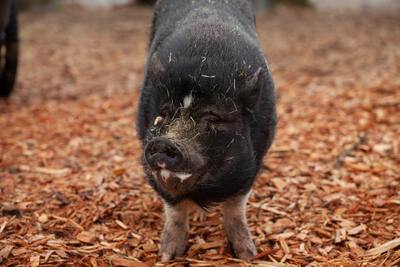
The Macrobiotic Diet
"Macrobiotics- a system of balance promoting health and happiness"
Michio Kushi is the best known living macrobiotic teacher, and since 1970 has been the leader in spreading macrobiotics worldwide through his students and books. He and the late Herman Aihara were the prime ones to bring it to the U.S. and teach it here (along with their wives, Aveline Kushi and Cornelia Aihara) through residential study centers, lectures and books.
Both, along with their wives, learned macrobiotics from their teacher George Oshawa in Japan. He coined the term "macrobiotics."
Oshawa in turn had refined what he learned (beginning at age 10 when he was very seriously ill) from Sagen Izuku (sp?). It is said that he was so famous there that the post office delivered letters to him with the one line address "to Mr. Anti-Doctor." So macrobiotics was actually developed as a practice by a man who was born in 19th century Japan.
Of course Michio Kushi and the others would agree that macrobiotics is a practice designed to help humans get back in touch with their natural instincts so that they follow those and live healthy and happy lives as a result -- and that those instincts were given to us when we were created rather than invented by a human.
Macrobiotics itself could be defined as a system of balance aimed at promoting health and happiness, based largely on yin and yang, and most widely known for its application to food. Macrobiotics emphasizes natural, whole, locally grown plant foods.
Although the Macrobiotic diet (or better said "Macrobiotic lifestyle") would be largely vegetarian, it also sometimes contains fish.
Written by M. Lieber from Chicago. More information on macrobiotic diets at Macrobiotics Online, www.macrobiotics.org
Disclaimer: The views expressed in articles published on HappyCow are those of the authors alone. They do not represent the views or opinions of HappyCow nor its staff.
Some links in this article are possibly part of Amazon's affiliate program, so when you make a purchase a small amount will go to support the HappyCow website.
This information is not intended to replace the diagnosis, treatment and services of a physician. Any recommendations and indications are at the user's discretion. For severe or life-threatening conditions, always seek immediate medical attention. While we work to ensure that product information is correct, and list only products containing vegetarian ingredients, on occasion manufacturers may alter their ingredient lists. Actual product packaging and materials may contain more and/or different information than that shown on our Web site. We recommend that you do not solely rely on the information presented and that you always read labels, warnings, and directions before using or consuming a product. For additional information about a product, please contact the manufacturer. HappyCow assumes no liability for inaccuracies or misstatements about products.




